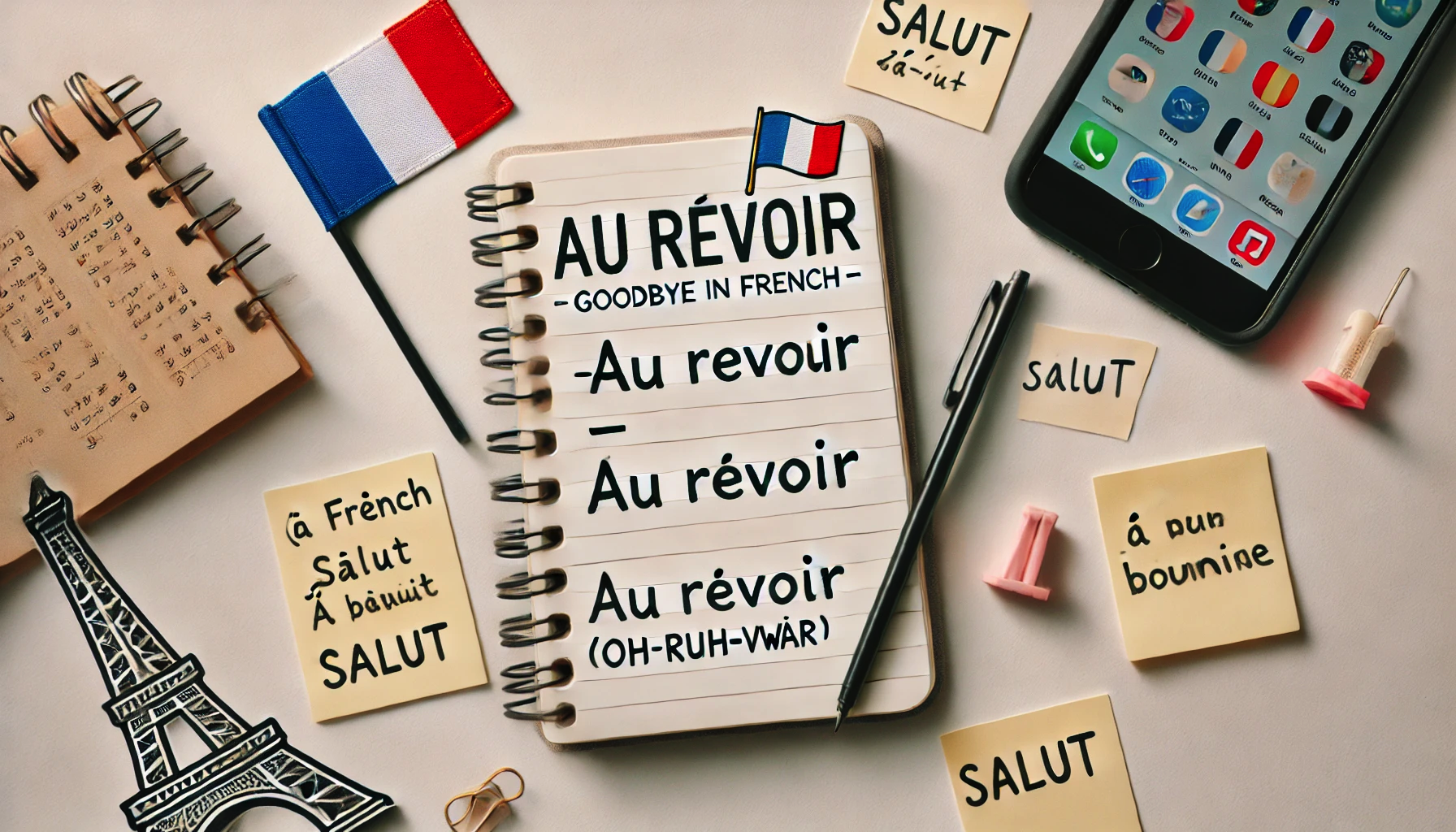If you’re learning French, the first goodbye you’ll hear is au revoir. It’s neutral, polite, and safe in most situations.
But it’s not the only one you’ll need.
French has different ways of saying goodbye depending on who you’re talking to , when and where .
There are quick goodbyes, formal ones, and casual phrases that French use every day. If you want to sound more fluent and less like an app, you’ll want to learn the difference.
This guide covers 21 real ways to say goodbye in French, how to use them, and when each one fits.
Why It’s Not Just “Au Revoir”
You don’t use the same goodbye for your boss and your friend. It’s the same in French.
Here’s why context matters:
- Formal Use phrases that show respect. Think work, appointments, or people you don’t know well. Example: “Je vous souhaite une bonne journée” (I wish you a good day) works better than just “Salut.”
- Informal Friends, family, and everyday moments call for short, relaxed goodbyes. Example: “À plus” or “Salut” feels more natural when talking to someone your age.
- Phone calls French speakers often say “À tout à l’heure” or “Bonne journée” at the end of a call, not just “bye.”
If you only say “au revoir,” you’ll sound polite but stiff. When you mix in the right phrases, you’ll sound more real and confident.
Formal ways to say Goodbye
Use these at work, with strangers, or in polite settings.
- Au revoir – Safe for any situation
- À bientôt – See you soon
- À tout à l’heure – See you in a bit (same day)
- Bonne journée – Have a good day
- Bonne soirée – Have a good evening
- À la prochaine – Until next time
- Je vous souhaite une bonne journée – I wish you a good day
- À demain – See you tomorrow
You’ll hear these a lot in offices or stores. In emails, formal letters, or calls, they’re expected.
9 Casual and Everyday ways to say Goodbye in French
- Salut – Hi or bye (super common)
- À plus (tard) – See you later
- À tout – Short version of “à tout à l’heure”
- Ciao – Borrowed from Italian, casual vibe
- Tchao – Same meaning, different spelling
- À la prochaine – Works with both friends and coworkers
- Bisous – Means “kisses,” common among close friends or family
- À plus dans le bus – A fun way to say “see you later,” used jokingly
- On se voit bientôt – We’ll see each other soon
If you’re just starting out, stick with salut and à plus for casual goodbyes.
Here’s a guide that helps with that: French learning tips for beginners
Slang and Regional Variations
Used in texts, online chats, or spoken between locals.
- Tcho – Short and super informal
- Bye – Yes, some French people just say “bye”
- Adieu – Final goodbye, rarely used unless it’s permanent
Most of these won’t show up in your textbook. You’ll pick them up faster if you listen to native speakers or watch French shows.
Pronunciation Tips so you Don’t Sound Robotic
You don’t need to sound perfect, but you do need to sound natural. French goodbyes are short, but a slight mispronunciation can confuse people or make things awkward.
Here’s how to make it better:
- Drop the final consonant when needed “Au revoir” sounds like oh ruh-vwar Not: ow ree-vore
- Keep it quick French goodbyes are often fast and low key. Don’t drag them out.
- Listen and copy Watch French YouTube, movies, or news. Pause and mimic what you hear. Repetition helps.
- Practice out loud Reading silently doesn’t train your mouth.
Listen to it :
Thinking about improving your accent in person? Check this: best places in France to learn French
When you focus on pronunciation early, you build habits that stay with you.
Saying Goodbye in Specific Situations
Different situations need different words. Here’s how to handle each one:
On the phone
You’ll often hear:
- “Bonne journée” (Have a good day)
- “À tout à l’heure” (Talk soon)
- “À bientôt” (See you soon)
These feel more natural than just saying “au revoir” and hanging up.
By email or message
Formal:
- “Cordialement” (Best regards)
- “Bien à vous” (Sincerely)
Informal:
- “À plus”
- “À demain”
- “Bonne soirée”
At work
Keep it polite. Use:
- “Au revoir”
- “Bonne journée”
- “À demain” if you’ll see them the next day
With friends or family
You’ve got more room to relax:
- “Salut”
- “Bisous”
- “À plus” Some even say “Tchao” or just “Bye”
In a romantic setting
- “À très vite” (See you very soon)
- “Tu vas me manquer” (I’ll miss you)
- “Prends soin de toi” (Take care)
And if you’re writing something sweet or thoughtful, this might help: how to say thank you in French
Practice, Listen, and Use It Often
You don’t need to memorize every phrase in one day. Start with the ones you hear the most. Say them out loud. Use them in real conversations, even if it’s just with yourself.
Here’s what works:
- Pick 3 from this list
- Say them when leaving a room, ending a call, or finishing a message
- Watch how French speakers use them in videos or podcasts
- Repeat daily until it feels automatic
French is easier when it’s part of your routine. The more you use these phrases, the more natural they become.
If you’re just starting out, build your foundation with French learning tips for beginners





